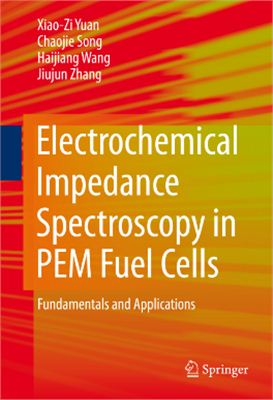Springer, 2009. 420 p. ISBN:1848828454
Fuel cells, as environmentally-friendly power generation devices, have been fully recognized by scientists, govements, and the public as a unique solution to several of the most important issues that we face today: diminishing supplies of fossil fuels, environmental pollution, and global warming. Electrochemical Impedance Spectroscopy in PEM Fuel Cells discusses one of the most powerful and useful diagnostic tools for various aspects of the study of fuel cells: electrochemical impedance spectroscopy (EIS).
The increasing speed of the development of fuel cell technologies brings many new researchers from different backgrounds into the field and, although the EIS technique is well-developed in other areas, it cannot be automatically transferred and applied to fuel cell research. This comprehensive reference on EIS fundamentals and applications in fuel cells contains information about basic principles, measurements, and fuel cell applications of the EIS technique. Many illustrated examples are provided to ensure maximum clarity and observability of the spectra.
Electrochemical Impedance Spectroscopy in PEM Fuel Cells will enable readers to explore the frontiers of EIS technology in PEM fuel cell research and other electrochemical systems. As well as being a useful text for electrochemists, it can also help researchers who are unfamiliar with EIS to lea the technique quickly and to use it correctly in their fuel cell research. Managers or entrepreneurs may also find this book a useful guide to accessing the challenges and opportunities in fuel cell technology.
Fuel cells, as environmentally-friendly power generation devices, have been fully recognized by scientists, govements, and the public as a unique solution to several of the most important issues that we face today: diminishing supplies of fossil fuels, environmental pollution, and global warming. Electrochemical Impedance Spectroscopy in PEM Fuel Cells discusses one of the most powerful and useful diagnostic tools for various aspects of the study of fuel cells: electrochemical impedance spectroscopy (EIS).
The increasing speed of the development of fuel cell technologies brings many new researchers from different backgrounds into the field and, although the EIS technique is well-developed in other areas, it cannot be automatically transferred and applied to fuel cell research. This comprehensive reference on EIS fundamentals and applications in fuel cells contains information about basic principles, measurements, and fuel cell applications of the EIS technique. Many illustrated examples are provided to ensure maximum clarity and observability of the spectra.
Electrochemical Impedance Spectroscopy in PEM Fuel Cells will enable readers to explore the frontiers of EIS technology in PEM fuel cell research and other electrochemical systems. As well as being a useful text for electrochemists, it can also help researchers who are unfamiliar with EIS to lea the technique quickly and to use it correctly in their fuel cell research. Managers or entrepreneurs may also find this book a useful guide to accessing the challenges and opportunities in fuel cell technology.

